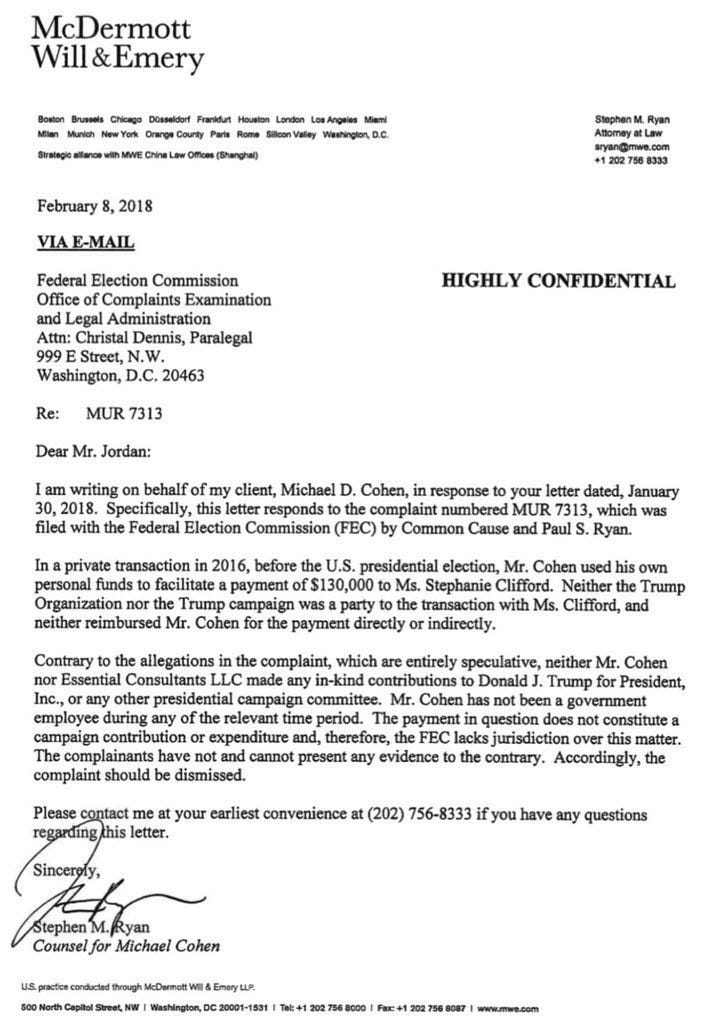Micheal Cohen already went to jail for helping Trump with the crime.
Liar ....
What Crime .... Be Specific, WHAT CRIME did Trump Ask Cohen to commit ?
Why hasn't Trump been charged and convicted ?
The Federal Election Campaign Act holds that an “expenditure” is any “purchase, payment, loan, advance, deposit or gift of money, or anything of value, for the purpose of influencing any election for Federal office.”
According to Cohen and the U.S. Attorney, the hush-money payments were, it appears, made in the hopes of preventing information from becoming public before the election, and hence were “for the purpose of influencing” the election. This means that, at a minimum, they had to be reported to the Federal Election Commission; further, if they were authorized by Mr. Trump, they would become, in the law’s parlance, “coordinated expenditures,” subject to limits on the amounts that could be spent. Since the lawful contribution limit is much lower than the payments made, and the payments were not reported, this looks like an open and shut case, right?
Well, no. Or at least not in the way some might presume. To the contrary, the law — following our common sense — tells us that the hush-money payments outlined by the U.S. Attorney are clearly not campaign expenditures. There is no violation of the Federal Election Campaign Act.
To reach the opposite conclusion, the U.S. Attorney is placing all his chips on the language “for the purpose of influencing an election.” Intuitively, however, we all know that such language cannot be read literally — if it were, virtually every political candidate of the past 45 years has been in near-constant violation. The candidate who thinks “I need to brush my teeth, shower, and put on a nice suit today in order to campaign effectively” is surely not required to report as campaign expenditures his purchases of toothpaste, soap, and clothing. When he eats his Wheaties — breakfast of champions, and surely one cannot campaign on an empty stomach — his cereal and milk are not campaign expenses. When he drives to his office to start making phone calls to supporters, his gas is not a campaign expense.
So what does it mean to be “for the purpose of influencing an[] election”? To understand this, we read the statutory language in conjunction other parts of the statute. Here the key is the statute’s prohibition on diverting campaign funds to “personal use.” This is a crucial distinction, because one of the primary factors separating campaign funds from personal funds is that the former must be spent on the candidate’s campaign, while the latter can be used to buy expensive vacations, cars, watches, furs, and such. The law defines “personal use” as spending “used to fulfill any commitment, obligation, or expense of a person that would exist irrespective of the candidate’s election campaign.” So a candidate may intend for good toothpaste and soap, a quality suit, and a healthy breakfast to positively influence his election, but none of those are campaign expenditures, because all of those purchases would typically be made irrespective of running for office. And even if the candidate might not have brushed his teeth quite so often or would have bought a cheaper suit absent the campaign, these purchases still address his underlying obligations of maintaining hygiene and dressing himself.
"Cohen said he had no information against Trump," one memo summarizing attorney Robert Costello's interactions with Cohen stated. That memo, dated April 2019, recounted Costello's interview with federal prosecutors about conversations he and colleagues had with Cohen a year earlier.
Costello, a former federal prosecutor who has represented famous clients like George Steinbrenner, Leona Hemsley, Rudy Giuliani and Steve Bannon, told Just the News on Tuesday he provided Manhattan District Attorney Alvin Bragg's office with more than 300 pages of emails, memos and texts chronicling his dealings with Cohen.
He said his documents showed Cohen took out a bank loan known as a HELOC
— on his own — during the 2016 presidential election to pay Stormy Daniels $130,000 under a nondisclosure agreement so she would remain quiet about her alleged relationship with Trump. Cohen bragged he kept the situation quiet so that Melania Trump and Cohen's own wife wouldn't learn about it, Costello said in an interview on the John Solomon Reports podcast, recounting what he said Cohen told him back in 2018.
"He said," Costello recalled, "'I didn't believe the information, but I knew that this was a situation that would cause embarrassment. So I negotiated with this lawyer, and we worked out a an NDA ... for the payment of $130,000.'
"And I said, 'Did you get that money from Donald Trump?' 'No.' 'Did you get it from any Trump Organization?' 'No.'
"I said, 'Did you take that money out of your own savings or checking?' 'No.'
"I said, 'Well, how'd you get the money?' He said, 'I took out a HELOC loan.' 'Why would you take out a HELOC loan to cover something like this?' He said 'because I wanted to keep it secret. If I took money from my account, my wife would know about it. I didn't want my wife to know about it. I didn't want Melania Trump to know about it.' He said, 'That's why I did it that way.'" 

